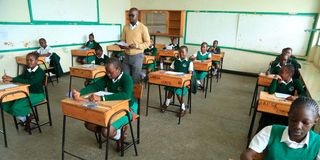Parents, pupils continue waiting for KPSEA results as schools reopen

An invigilator distributes exam materials during the Kenya Primary School Education Assessment (KPSEA) at Aga Khan School in Kisumu on November 1, 2023.
What you need to know:
- Grade 6 learners sat for their KPSEA test last year alongside KCPE and KCSE candidates to transition to Junior Secondary School.
- Ministry of Education had assured Kenyans that KPSEA reports would be ready before the learners begin junior secondary school in January 2024.
More than 1.2 million Grade 7 Junior School students will today transit to Grade 8, under the Competency Based Curriculum (CBC) as parents and education stakeholders continue waiting for the Ministry of Education to release the 2023 Kenya Primary School Education Assessment (KPSEA) results.
Grade 6 learners sat for their KPSEA test last year alongside KCPE and KCSE candidates to transition to Junior Secondary School. However, their results are yet to be announced as they are expected to join Grade 7 today when schools reopen for the 2024 education calendar.
This comes as National Assembly Minority Leader Mr Opiyo Wandayi expressed concerns over the delay in releasing the KPSEA results for the year 2023.
The MP for Ugunja said the delays would inhibit the smooth transition to Grade 7 as schools reopen today.
"The 2023 KPSEA results have not been released, hence inhibiting the transition to Grade 7, which is to open school on 8/01/2024. Parents and school administrators don’t know what to do,” Wandayi said on his social media page.
He urged the State to issue guidelines on when the learners should report to schools.
The KPSEA assessments covered five subjects: Mathematics, English, Kiswahili, Integrated Science, Social Studies, and Creative Arts.
Last December, during the release of the Kenya Certificate of Primary Education, the Ministry of Education assured Kenyans that the KPSEA reports would be ready before the learners begin junior secondary school in January 2024.
Meanwhile, Grade 7 students who are the pioneer CBC students will transition to Grade 8 today as the Ministry of Education begins to fully implement the Presidential Working on Education Reforms (PWPER) including the reduction of learning areas.
For instance, the grade 8 students will have a reduced workload following recommendations to scale down the number of core learning areas from 12 to 10.
Education stakeholders, led by the Kenya National Union of Teachers (Knut), have however urged the State to pump more funds into Basic Education to ensure it's free and compulsory.
“As the term begins Knut expects the government to deal with staffing challenges in the comprehensive schools that are still understaffed in terms of subjects, teacher enrolment and infrastructure. We have not hit the ratio of 1:45 teachers as required by Unesco, it is still a tall order,” said Knut Secretary General Collins Oyuu.
"Even the subject area covered we have not gotten what is there for specific learners. But let us not lament much even though the introduction to 8-4-4 had challenges like what we have currently but we managed," he added.
However, to overcome some of the biting challenges, Mr Oyuu said employment of more teachers will address the situation grappling with Grade 8. Mr Oyuu urged the state to ensure a 100 per cent transition from Grades 7 to 8.
“I expect all learners to go to school as the term begins because Kenya has invested in education although not as what is required but 100 per cent transition should be championed,” he added.
He said parents are struggling depicting how education is not as free. He said teachers have had a good rest and are ready to steer the education sector.
“Education is not free in Kenya much as we talk about it being free. Look at how parents throng shops for uniforms. It shows the parents have huge burdens. But let us focus on making education free and compulsory,” he said.
The National Parents Association chairperson Silas Obuhatsa said schools are reopening at a time when the education sector is undergoing challenges.
“We are worried especially in public schools which are very congested. We do not know what will happen now that we have comprehensive schools, especially in Grade 8. The State should deal with congestion. Members of Parliament should use NG-CDF to decongest schools by building more schools, putting up laboratories and home science facilities,” said Mr Obuhatsa.
However, he said parents are worried that Junior School teachers are threatening to strike. Mr Obuhatsa said it is unfair for the teachers to strike at a time when the government is reforming the education sector.
“We cannot allow children to stay at home without teachers. We have many unemployed teachers. TSC should act firmly if they make good on their threats,” he added.





